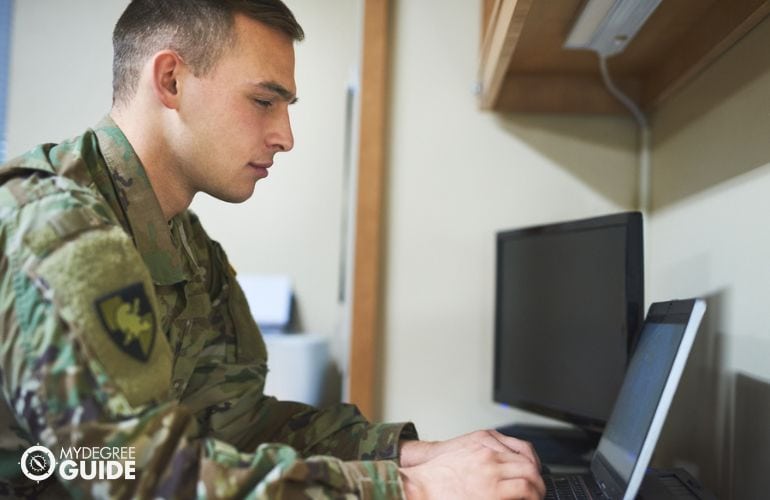If tuition discounts are on your mind, you may be wondering, “How long do you have to be in the military to get free college?”

Free or reduced-cost college classes are a significant perk of signing up for the military. To take full advantage of this benefit, it’s strategic to learn the ins and outs, including how long you’re required to serve.
Editorial Listing ShortCode:
The more you know, the better prepared you can be to pursue an affordable education.
How Long Do You Have to Be in the Military to Get Free College?

According to the US Department of Veterans Affairs, you’re typically required to serve on active duty for at least 90 days to benefit from the GI Bill. Once you reach 3 years of service, you will qualify for education benefits at the full level.
The following chart outlines what percentage of the full benefit you will receive based on how long you have served.
| Active Duty Service Duration | Percentage of Full Benefits |
| 1095 days (at least 36 months) | 100% |
| 910 to 1,094 days (30 to 35 months) | 90% |
| 730 to 909 days (24 to 29 months) | 80% |
| 545 to 729 days (18 to 23 months) | 70% |
| 180 to 544 days (6 to 17 months) | 60% |
| 90 to 179 days (90 days to 5 months) | 50% |
The length of service can be continuous or with breaks. Anyone who receives a Purple Heart automatically receives full benefits.
Anyone who serves for at least 30 continuous days and is then honorably discharged due to a disability acquired in the line of duty also receives full benefits. The GI Bill covers several costs related to education, such as:
- Books
- Fees
- Housing
- Relocation (in select cases)
- Tuition
The length-of-service tiers apply to each of these benefits, not just tuition. For example, if you qualify for 80% of the tuition benefits, you’ll also receive 80% of the housing allowance allotted to students attending your school.
VA Education Benefits: Understanding the GI Bill

The military offers several funding programs to help service members and veterans pay for college. According to the US Department of Defense, the most popular of these is the Post-9/11 GI Bill.
If you qualify for benefits at the full level, which usually requires at least 3 years of service, the Post-9/11 GI bill will pay your full tuition and fees at a state university. Partial coverage is available for tuition at private or foreign schools.
In addition, full-time students can receive a monthly housing allowance. Online students can receive a partial housing allowance. You can also get up to $1,000 per year to cover the cost of your books. Students from rural areas may receive a one-time payment of $500 to help them relocate nearer to school.
According to the US Department of Veterans Affairs, VA education benefits are available for up to 48 months, but many people qualify for a shorter amount of coverage.
Additional Military Education Benefits and Opportunities

The following are some additional benefits and opportunities you can explore to help cover the cost of higher education:
- Military Tuition Assistance (TA). For those currently on active duty, this initiative may pay up to 100% of your college costs. Each military branch has distinct TA application forms and processes.
- Montgomery GI Bill. This is an alternative to the Post-9/11 GI Bill and has differing eligibility and payment structures. You can use one or the other, but you can’t use both.
- Yellow Ribbon Program. This program aims to offset the remaining costs of higher tuition and fees not fully covered by the Post-9/11 GI Bill.
- Navy College Program for Afloat College Education (NCPACE). NCPACE ensures that educational opportunities remain accessible while serving aboard Navy vessels.
- Military colleges. Military colleges, such as the US Air Force Academy, offer free tuition. They may also cover the cost of books and board.
- ROTC scholarships. Students at non-military colleges may receive free tuition is they join the Reserve Officers’ Training Corps (ROTC) program. The required service commitments may differ depending on when the scholarship was awarded.
- State-provided education benefits. Numerous states offer extra military benefits, such as tuition waivers.
- Scholarships. You can apply for scholarships, too, from various organizations. Some scholarships are offered directly by colleges, and there are even scholarships just for military personnel.
All students, including those in the military, can fill out the Free Application for Federal Student Aid (FAFSA). Grants and loans are common forms of state and federal funding, and military members may receive assistance with loan repayment. These and other educational benefits are designed to make higher education more affordable for military service members and veterans.
Battling Debt: How Military Service Can Help with Existing Student Loans
According to the Federal Student Aid, the government implements a number of programs to aid military service members in managing their student loans:
- Military College Loan Repayment Program (CLRP). This program provides considerable financial aid toward repaying federal student loans. The terms and benefits can vary depending on your specific branch and job classification.
- Public Service Loan Forgiveness (PSLF). This initiative may forgive the remaining amount on your Direct Loans, provided you complete 120 payments during full-time employment with an eligible public service employer.
- Income-driven repayment (IDR) plans. These plans put a cap on your monthly payments for your federal student loans. The monthly amount is based on your income and family size.
- Servicemembers Civil Relief Act (SCRA) interest rate cap. The SCRA regulates interest rates for pre-service obligations, including student loans, capping them at 6%.
- Military service and post-active duty student deferments. You might be eligible to postpone your loan repayments during specific active duty periods and immediately after completing active duty.
- 0% interest. For those serving in areas deemed hostile that qualify for special pay, no interest is required on Direct Loans for up to 60 months.
- HEROES Act waiver. This waiver offers active-duty military members temporary relief from many of the documentation requirements attached with benefit programs.
- Department of Defense (DOD) loan repayment. In certain cases, the DOD might assume responsibility over repaying educational loans.
- Veterans Total and Permanent Disability (TPD) discharge. If you’re permanently disabled due to your service, you may qualify to have your loans fully forgiven.
As you can see, there are many military benefit programs and waivers in place to help you with your student loans. While some forgive debts completely, others are designed to make your payments more manageable.
Selecting Military-Friendly Colleges
A military friendly school is typically one that values military experience and provides support tailored to veterans or active-duty military members.
When researching schools, here are some factors to consider and keep an eye out for:
- Dedicated veterans services. Colleges with dedicated veterans services tend to understand the specific needs of service members.
- Flexible scheduling. Given the demanding schedules of military life, attending an institution that offers online classes or asynchronous learning can be helpful. According to the American Council on Education (ACE), 56% of military learners work full-time.
- Credit recognition. According to com, a number of colleges award credit for military training and experience.
- Student outcomes data. Institutions with strong graduation and job placement statistics typically offer substantial student support systems.
- Community and networking. Military-friendly schools may have an established Student Veterans of America The SVA creates community among veteran students and promotes networking and support throughout transitional periods.
- Recognition and rankings. You could research whether a prospective school is recognized or listed as providing comprehensive services to military and veteran students.
- Accreditation. Attending an accredited institution ensures that your degree will be recognized by future employers and academic organizations.
- Non-military scholarships. You can consider schools that provide additional aid opportunities, such as merit-based scholarships and partnership programs with companies for veteran-specific resources.
According to the US Government Accountability Office (GAO), while it’s strategic to enroll in a school that lets you utilize your GI Bill, it’s important to prioritize finding a school that offers a quality education and best meets your needs.
The College Navigator is an online tool that can help you in your college search. This tool is provided by the National Center for Education Statistics (NCES), and it allows you to sift through multiple institutions based on factors such as location, tuition, and type of program.
How to Claim Your Military Educational Benefits

The proper steps for using your military tuition benefits will depend on whether you are taking advantage of the Tuition Assistance program or the GI Bill.
To use the Military Tuition Assistance program, you may follow these common steps:
- Let your chain of command know that you are interested in school.
- Choose an accredited college.
- Participate in Tuition Assistance orientation or counseling.
- Specify a plan for meeting your educational goals.
- Apply for Tuition Assistance through your branch of the military.
- Enroll in classes.
- Give your tuition voucher to your school.
The Tuition Assistance program is affiliated with the Department of Defense and run by the individual branches. The specifics of the program can vary among the branches.
If you are using the GI Bill for your schooling, the process is different:
- Make a plan for where you want to attend college.
- Apply through the US Department of Veterans Affairs. Specify which GI Bill you plan to use.
- Wait for approval, which will come in the form of a Certificate of Eligibility (COE).
- Enroll in school.
- Each semester, have your school certify that you’re enrolled.
The GI Bill is administered by the US Department of Veterans Affairs.
Limitations and Exceptions
Military educational benefits all have specific eligibility requirements and stipulations for use.
Let’s examine potential limitations and exceptions:
- Time limits. For instance, those who were discharged before 2013 can access Post-9/11 GI Bill benefits for 15 years following their last active duty period. Thanks to a new law, GI Bill benefits won’t expire for those discharged during or after 2013.
- Exclusions. Not all programs cater to every service type or branch. For instance, most branches have their own loan repayment program (LRP) with unique criteria and stipulations.
- Service requirements. Specific programs stipulate particular durations or types of service. An example is the Yellow Ribbon Program, wherein full benefit eligibility requires a cumulative active-duty period of at least 36 months.
- Discharge status. Most often, eligibility requires veterans to possess an honorable discharge. Other discharge types could limit access toward these educational benefits.
When exploring military educational programs and benefits, it’s beneficial to pay close attention to its eligibility criteria and stipulations for use. You can confirm limitations of a specific benefit by reaching out to the VA or your respective service branch.
Should I Join the Military to Pay for College?
Deciding to join the military to pay for college is a personal decision that hinges on your career objectives, aspirations, and readiness to serve.
That said, the military does offer significant educational benefits, such as the GI Bill, tuition assistance, loan repayment programs, and scholarships. These benefits can help reduce or even eliminate college costs. While military service can help you gain valuable skills, work experience, and education funding, it’s also a commitment that requires discipline and potential risk.
If joining the military aligns with your values and long-term goals, then it could be a strategic path to consider.
How Does the Military Pay for College?

The military has several different programs that can help students pay for college. For those on active duty, two different options are the Post-9/11 GI Bill and the Tuition Assistance program.
The Tuition Assistance program may pay for your full education at a public university, but the details vary among branches. Additional assistance may be available through the Tuition Assistance TOP-UP program or a Yellow Ribbon college.
For veterans, either the Post 9/11 GI Bill or the Montgomery GI Bill are available. GI Bill eligibility depends on the length of time you have been in the service.
How Much Does the GI Bill Cover?

Military tuition assistance through the GI Bill pays for more than just tuition. It can also cover:
- Books. You can get a book stipend for each credit hour you take, with a maximum of $1,000 per year.
- Housing. You may receive payments to help with housing costs while attending in-person or online school.
- Moving expenses. Select rural students are eligible for a one-time relocation payment of $500.
- Tuition and fees. The GI bill pays the full tuition and mandatory fees at public colleges and a portion of private and foreign school costs.
If you have served for less than 3 years, you’ll receive benefits at a reduced level.
Can Military Education Benefits Be Used for Graduate Studies?
Yes, military education benefits can be used for graduate studies. The Post-9/11 GI Bill provides financial support for masters or doctoral programs at colleges and universities that are approved by the Department of Veterans Affairs (VA). This benefit covers tuition and fees up to a state maximum amount.
Stipulations can also vary depending on your specific benefits or service branch. So, to confirm your potential coverage, it’s essential to verify the details with your respective service branch or through the VA directly.
Can I Transfer My Educational Benefits to My Family?
Service members on active duty may have the option to transfer their benefits to a family member. There are stipulations that must be met, though, before you can transfer your military or army tuition assistance, so you might consider those carefully before you commit.
First, you’re required to have put in at least 6 years of service before you are eligible to transfer your benefits. Additionally, you’re required to agree to serve for at least another 4 years. Purple Heart recipients are an exception to these rules.
Taking the Next Steps Through Military Education

With your military college benefits, you have the opportunity to further your education.
Depending on how long you’ve been in the service and where you go to school, you may pay very little for your courses. Free college is a strategic way to get an education that can bolster your military career or prepare you for jobs after the military in the civilian sector. You can use your military tuition perks at either an online program, like an online military science degree, or an on-campus college program.
Can you go to college while in the military? Indeed! Why not take a look at accredited, military-friendly schools to find the one that is right for you? You’ve earned this benefit, so don’t miss out on the opportunity for a great education!
